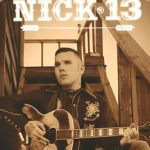“Blame the Stones for everything,” Kris Kristofferson sarcastically sings, opening his first album with a mocking march (Part I about Chris). He almost quotes The Rolling Stones, mentioning, among other vices of society, the bored housewives of “one-story” America, who are addicted to drugs called “little mother’s assistants” by the Rolling Stones. The media increasingly resorted to sensationalism, regardless of cause and effect, ignoring, in particular, the fact that it was the addiction of the fat wives of “Sunday golfers” to pills that gave rise to the scandalous, according to the notorious media, the song Mother’s Little Helper, and not vice versa. You can spend your whole life singing about love, but if you suddenly have a text in your repertoire about an innocent children’s attraction called helter skelter, you will suddenly discover some Charlik with frankly bad intentions. But “blame the Stones”!

Listen to Kristofferson album online on Youtube.com
Chris dedicates the next song to Johnny Cash and June Carter, saying that it was they who taught him “how to defeat the devil.” To Beat The Devil is a thoughtful narration from the perspective of a man trying to reach the rest of the world with his poems, hiding behind doors with heavy locks.
“The truth is that no one will ever want to hear.”
In some ways, this poem anticipates the mood and concept in which Johnny Cash recorded his famous recent albums. Considering how Cash influenced Kristofferson, it is safe to say that Kristofferson has firmly embedded himself in the perception and manner of Cash.
Casey’s Last Ride is decorated with a cinematic string arrangement, but the lyrics sound like David Lynch is filming Midnight Cowboy.
Just The Other Side Of Nowhere is a melancholic country song with beautiful lyrics. “I’m sick of spending Sundays wishing it were Mondays” – the words of a day laborer who arrived in a snowy metropolis, waiting for casual earnings so as not to freeze on the soulless streets.
For The Good Times is a ballad set by a violin quartet. Chris’s voice is wearily cracked, telling more in its timbre than others can in open books.
The Law Is For Protection Of The People gives out Kristofferson’s most “Johnnycash” manner, while again denouncing the existing orders at that time, such as, for example, the haircut of hippies by individual officers of the law. Hippy lives matter, isn’t it?

Darby’s Castle is an interesting story about a certain Darby, who built a castle in the name of love for his wife. The character immerses himself in the process so much that the wife, ignoring the lock, goes to the left. And to the right. And in other directions. The song would suit Dusty Springfield.
Duvalier’s Dream is a very accurate observation of a man who has become disillusioned with the human world. We must not forget that Kristofferson was going to become a writer, and he based his work clearly on Dostoevsky, not on Dickens.

Sunday Morning Coming Down is an absolute masterpiece. Although, perhaps, the main meaning will be clear only to hungover bachelors …
Help Me Make It Through The Night was born out of a phrase Frank Sinatra threw at a question: “What do you believe in? “Girls, the Bible, swill.” Anything that gets you through the night.” The second masterpiece of the album, sung by many, and the Elvis version should be heard by everyone who respects his taste.
The third masterpiece is Me And Bobbie McGee, mentioned in the first chapter of our story, which has become a must-have number for such rock and roll giants as Jerry Lee Lewis and Sleepy LaBeouf.
The Kris Kristofferson album, which passed unnoticed by the general public, proved to be in demand among the thinking public, and the filmmakers saw the potential of a movie star in Kristofferson’s Nordic type. Thus began, truly, the most interesting career in American show business.
To be continued… Part 3.













